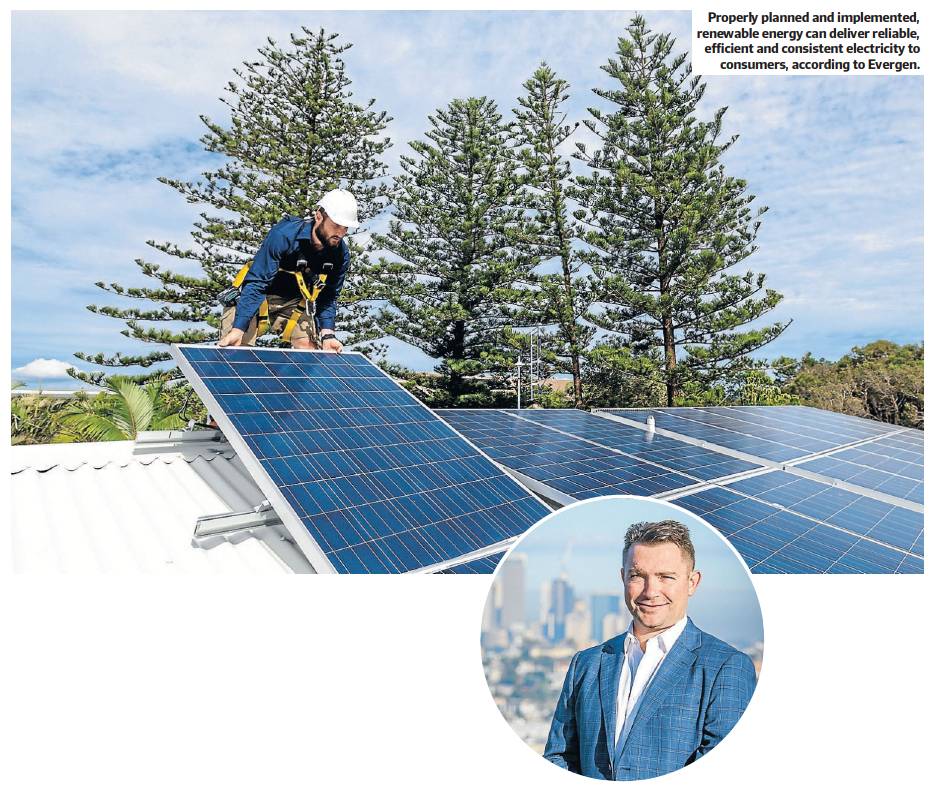Renewables can do us a power of good
When it comes to renewable energy, it’s hard to beat the extraordinary challenges and changes that have occurred in South Australia in the past few years.
Think back to September 2016, when the state endured lengthy and economically damaging blackouts after electricity transmission towers collapsed during wild storms at the same time as a crucial cross-border interconnector providing base-load energy failed.
The Wetherill Labor government endured blistering criticism from the Turnbull government, which questioned the state’s adherence to renewable energy sources and its ability to maintain a secure and constant grid.
Now, after the installation of mega-batteries designed to store the substantial energy the state reaps from wind and solar projects, South Australia’s Energy Minister Dan van Holst Pellekaan – a Liberal – is comfortably predicting the state will generate more than 100 per cent of its energy needs from renewable sources by 2030. He expects South Australia will have the capacity to export excess renewably-sourced energy to the eastern states in just over a decade.
The remarkable turnaround demonstrates how the private sector and state governments are pushing ahead with cleaner and cheaper energy sources regardless of the view from Canberra.
Victoria, too, has been actively encouraging renewable energy projects, especially at the retail level.
Ben Hutt, the chief executive of infra-tech energy solutions company Evergen, points to the achievements in South Australia and state government subsidies elsewhere as evidence that businesses and households can take charge of their energy costs, consumption and environmental impact without having to wait for the federal government to do something.
“At a federal level, before the election, we saw lots of people waiting for Labor to get voted in because of the very strong campaign they had for renewables and climate change [action],” he said. “But state governments across the country, except for Western Australia, are still heavily incentivising people to invest in their own renewable energy solutions.”
Hutt noted how in 2017, despite fierce criticism and ridicule at the time, the private sector intervention by Atlassian co-founder Mike Cannon-Brookes and Tesla founder Elon Musk helped bring about a relatively fast and welcome change in South Australia’s energy fortunes and reliability.
Within the promised time frame of 100 days, Tesla and French group Neon installed and commenced functioning a huge lithium-ion battery at the Hornsdale wind-farm project near Jamestown, 200 kilometres north of Adelaide.
“At the time it was decided to do that, most people thought it was ridiculous and wasn’t going to work,” Hutt said. “What we see now is that battery is the single most-celebrated piece of industry infrastructure in Australia. It reduces the cost of energy for everyone in South Australia, and it’s generating revenue from its existence.”
Evergen’s goal is for similar leaps to be made at the retail level. Hutt said at least one grid operator was planning its business on the likelihood that 70 per cent of households would be solar-sufficient by 2030, and that those minienergy producers could be interlinked and feeding energy to each other on demand.
“All of the grid operators are now investing in moving towards a smart grid, which is a two-way connected platform rather than one-way connected.” In other words, energy derived from multiple sources – not just a base-load power station, for example – could be drawn and directed around the grid as needed.
Evergen, which has financial and technological backing from CSIRO and AMP Capital, has plans to become more than a provider of the solar and distributed storage infrastructure. It plans to become an energy retailer in July, offering 100 per cent carbon neutral or renewable energy to consumers.
His aim is for the pricing to be no more expensive than other retailers, and for customers to benefit from additional revenue from participation in virtual power plants and other opportunities, but he believes the industry trend to charge more for renewable or so-called “green” energy options is “purely ridiculous” and should be challenged.
“It should be 100 per cent carbon neutral, renewable and, ideally, it would be very inexpensive and completely risk-free for consumers,” he said. “The proposition we will be taking to market is that Evergen is here to support home owners and businesses across Australia with simple renewable energy solutions in front of the meter, at the meter, and behind the meter. We have also secured an initial $50 million in funding to allow us to deploy these systems where the home owner or business cannot afford to pay for it up-front. Everyone should benefit from the opportunity, not just those who can afford to.”
Hutt said the company wanted customers to profit from the energy they can create, rather than being hit with rising bills every month. “Our customers, in aggregate, produce about enough energy for them all; the challenge is allowing each of them to benefit from this.” Hutt said consumers faced with high energy costs and rising concerns about carbon emissions wanted solutions that would give them control while increasing the reliability of their energy supply. At Evergen, customers buy solar panels and their battery, which is optimised using CSIRO/ Evergen tech (performing 20 per cent better or more than without this), and it can then be integrated with sophisticated metering and control technology that enables the system to measure and control key loads in a property to ensure optimal savings. “The energy industry is complex and easily misunderstood,” said Hutt. “And the rhetoric that renewables are ‘not practical’, ‘won’t work’, ‘will interfere with the way the system works’ is complete rubbish. Choosing renewables today is not only practical, but if everybody did it, everybody would be paying zero dollars for their energy.”
“Choosing renewables today is not only practical, but if everybody did it, everybody would be paying zero dollars for their energy.”
Ben Hutt
